ARTICLE AD BOX

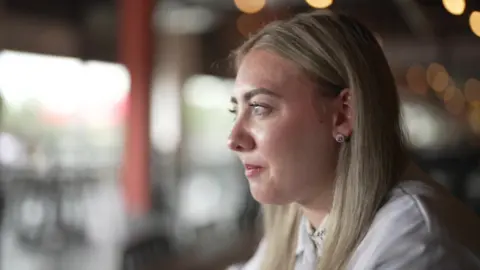 BBC
BBC
Consumers are being exposed to an increased risk of food poisoning because of delays in food hygiene inspections, a BBC investigation has found.
Analysis shows one in five restaurants and takeaways had not been seen by food inspectors for more than two years.
Environmental health teams say a recruitment crisis and a backlog from the pandemic are behind the trend.
The public services union Unison said it was a "serious public health issue".
A spokesman said: “Inspections are now so delayed that it’s perfectly possible for food businesses with shoddy hygiene practices to operate with little fear of ever being caught.”
The BBC's findings come amid heightened food safety concerns following an E-coli outbreak in June linked to contaminated products.
Hospitality UK, which represents food and drink businesses, said three quarters of eateries gained the top hygiene rating score on their latest inspection.
“Despite the pressures the sector has faced in recent years, the safety of our customers remains non-negotiable," a spokesman said.
'Full of detritus'

 Steph Holloway
Steph Holloway
Steph Holloway and her partner both had food poisoning after eating out last year
With such a long time between inspections, even supposedly low-risk establishments can let standards slip, according to classic car blogger Steph Holloway.
The 36-year-old from Huddersfield suffered from suspected food poisoning after eating out at a curry house in May 2023.
Even though it had a five-star hygiene rating, she said it was immediately clear things had changed since the last time it was inspected more than two years previously.
“I walked in and I thought ‘this isn’t very clean’,” Steph said. “We just said, ‘oh let’s eat, it will be fine’ - but it wasn’t fine."
Steph and her boyfriend noticed the tray used to serve the poppadoms was extremely dirty.
“It was just full of detritus," she said. "It looked like it had sat in someone's cupboard for 10 years."
Steph also noticed black dirt on the door handles and a full mop bucket being used to prop a fire door open.
Within hours, her and her boyfriend became ill and Steph remained in bed for the following two days.
The couple complained about the restaurant, but the premises was not inspected again until September that year.
It received a zero, the worst score a food outlet can receive.
Inspectors found mouldy fruit in the fridge, poor cleaning practices and fruit flies around the kitchen. It was inspected again in April this year and currently has a three-star rating.
“We are being very careful about where we go,” said Steph.

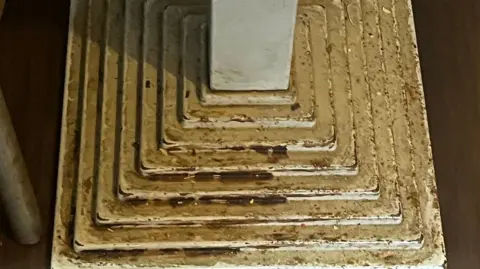 Steph Holloway
Steph Holloway
Photos taken from within the restaurant by Steph Holloway show thick grease coating the table

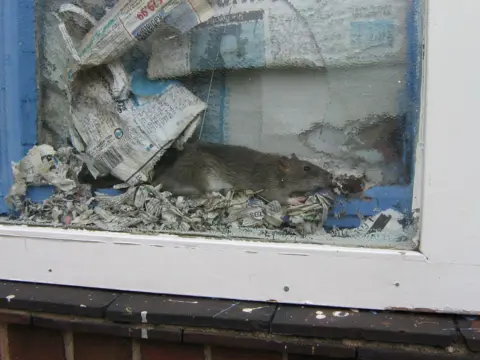 Local Democracy Reporting Service/ Walsall Council
Local Democracy Reporting Service/ Walsall Council

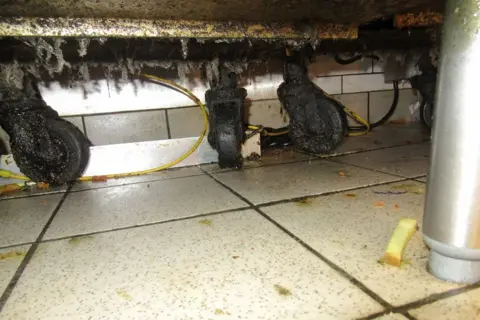 Local Democracy Reporting Service/Waltham Forest Council
Local Democracy Reporting Service/Waltham Forest Council
A rat was found in the window of a Walsall takeaway
Grease covers the bottom of a work surface at a takeaway in London
'Something different every day'

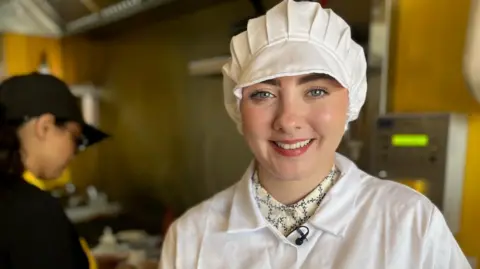
Hygiene inspector Nicola Carrington says many people her age are not aware of the profession
Cockroaches, rat droppings and mouldy food - the life of a hygiene inspector might not seem the most glamorous.
But the body overseeing food safety is hoping to reverse a recruitment crisis that could be exposing customers to serious illness.
Nicola Carrington, 24, is in the age range within which councils around the country are trying to attract new recruits.
She works for the environmental health team at Salford City Council and loves her job.
"I've been to businesses, which are really quite bad," she said. "I’ve been to one with a cockroach infestation. I think the businesses know there’s an issue but what do they do about it?"
Nicola studied chemistry, biology and physics at college before an environmental health degree at Liverpool John Moores University. Being an inspector is something she always wanted to do.
"The majority of the time people are surprised when I walk in," she said. "They say 'you’re a bit young aren’t you'?
"People just don't know how to get into it. I just don’t hear anyone speaking about it at college or at university."
But Nicola says it can be a really interesting and rewarding job.
"You are doing something different each day, every food business owner is different. You get to meet so many different people, you dont know what you are going to expect."
What do hygiene inspectors do?
Guidelines state most food premises in England, Wales and Northern Ireland should be inspected between six months and two years, depending on the level of risk.
Some extremely low-risk businesses, such as pharmacists and greengrocers, can be inspected within three years.
Council-employed teams rate premises on things like cleanliness, pest control and safe storage of food - giving a score between zero in the worst cases and five in the best cases.
They also have the power to shut businesses down in extreme circumstances.
The BBC's analysis of more than 250,000 public records on the Food Standards Agency website has found more than 53,0000 had not been inspected since 2021.
In Scotland, which runs a pass or fail food hygiene scheme, nearly 40% of businesses were last assessed more than two years ago.
'Very uncomfortable situation'

 FSA
FSA
Food Standards Agency chief executive Emily Miles
Emily Miles, the chief executive of the Food Standards Agency, which oversees food hygiene inspections in England, Wales and Northern Ireland, said councils were generally getting through backlogs of high-risk inspections, which mounted during the Covid lockdowns.
But she said the agency was concerned lower-risk venues and new venues were not being checked.
A long-term decline in council food safety funding and a 15% drop in hygiene inspection staff over the past decade had left town halls struggling to assess businesses in time, she said.
In April 2021, the backlog stood at 77,000 businesses awaiting an inspection in England, Wales and Northern Ireland, which is double the usual level.
Recruitment, she said, was the biggest challenge. Currently, between one in seven and one in ten posts are unfilled.
The agency has launched a national apprenticeship scheme and is considering lowering the skills criteria needed to enter the profession in order to boost numbers.
“It’s something that could be a slow burn to a very uncomfortable and unhelpful situation," Ms Miles said.
"If there are not enough people with the right skills in these local authority inspection roles - there just isn’t that line of defence."
The agency's research showed people were more at risk of E-coli, salmonella, norovirus and listeria in a premises that had received a three-out-of-five rating, rather than a five-out-of-five.
The effects of a major outbreak, Ms Miles added, could be devastating.
"It’s not worth the pain and tragedy of the people who get sick and it’s not worth the dent in our trust as a food nation," she said.
A spokesman for Food Standards Scotland said staffing levels were critically low because of "too few qualified officers to fill the existing posts".
The staffing deficit is currently estimated to be around 47% of the local authority need in Scotland, he added.
'Significant challenges'
Phoebe Clay is director of Unchecked UK, a collection of organisations that campaign for better consumer regulation.
She urged the new Labour government to boost funding to councils.
"Relatively small investments would make the difference between having an inspection every two years to having one every six months," she said.
A spokesman for the department for Housing Communities and Local Government, which oversees the work of councils in the UK, said: “We will get local government back on its feet by doing the basics right.
“We will do this by providing councils with more stability through multi-year funding settlements, ending competitive bidding for pots of money and reforming the local audit system.”
A spokesman for the Scottish Government said Brexit and the introduction of new export processes had added extra workloads to the food hygiene teams at local authorities in the country.
"We recognise the significant challenges councils face in continuing to deliver sustainable environmental health services in communities across Scotland."
More about this story
The Shared Data Unit makes data journalism available to news organisations across the media industry, as part of a partnership between the BBC and the News Media Association.
Read more about the Local News Partnerships here.

 9 months ago
32
9 months ago
32

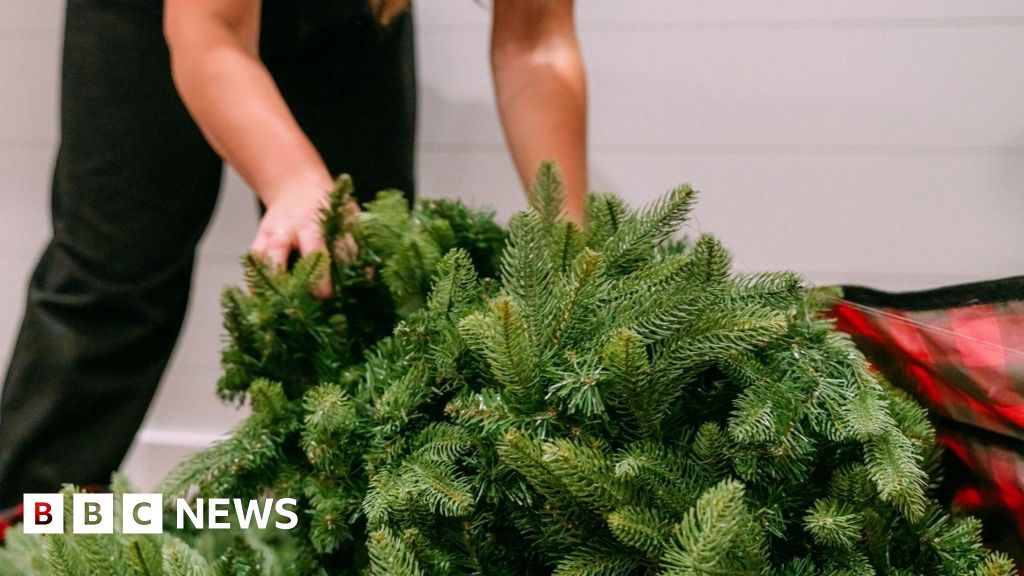
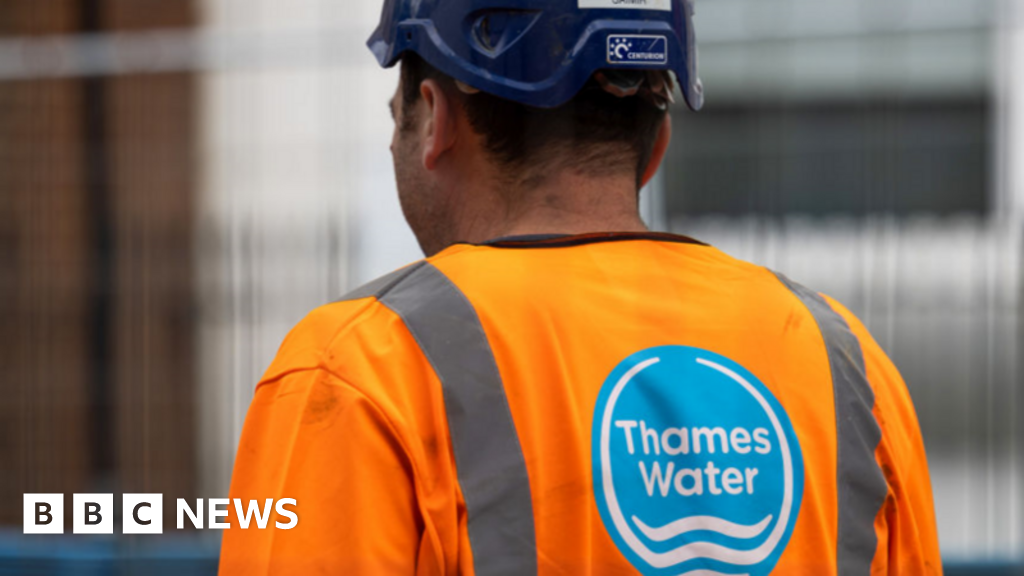





 English (US) ·
English (US) ·